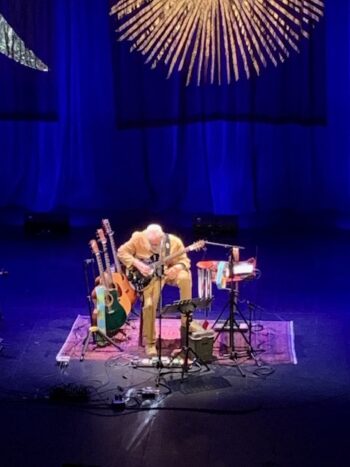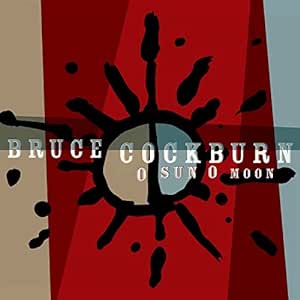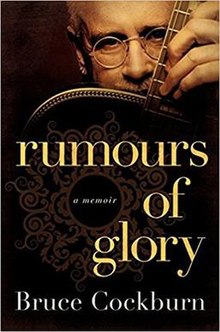
By Brian Nixon —
About twenty-five minutes in to his second set at the Kimo Theater in Albuquerque, New Mexico a person in the audience hollered “Jesus Christ loves you, Bruce.” The Canadian musician responded back, “Doesn’t He love everybody, I think!” The crowd cheered.
If you use his recent musical release, O Sun O Moon, as a case example of his sentiments, you’d know Bruce Cockburn believes what he said.
After the reply, Cockburn began to play one of his poetic songs of praise, “Lord of The Starfield.”
Lord of the starfieldsAncient of DaysUniverse MakerHere’s a song in your praise
Cockburn has made it a career to poetically articulate his faith, questions and concerns in tow.

And now at age 78, Cockburn has created a beautiful and poignant masterpiece—O Sun O Moon, reflecting further on his faith (particularly as he gets older), activism, and musical journey, one that has spanned fifty-four years (his first solo record was released in 1970).
On O Sun O Moon Cockburn addresses a Christian’s call to love all people (Orders), the beauty of creation and life as one enters the later stages of existence (Into The Now), the need to live with kindness (Us All), the recognition of the deteriorating environment (To Keep the World We Know), the power of the Holy Spirit (When the Spirit Walks in the Room), and entering heaven (O Sun O Moon and When You Arrive).
To say the least, Cockburn’s Christian conscience plays an important role on the album—as it has the past forty years.

Born in Ottowa, Ontario in 1945, Cockburn had an experience with God in the 1970’s—as discussed in his book, Rumors of Glory—whereby his music took a decidedly spiritual turn. In the late 1970’s and 1980’s, his love of nature, oppressed people, and the need for greater justice launched him as the conscience of pop music. In the 1990’s, Cockburn turned out some of his greatest works, Nothing but a Burning Light, Dart to the Heart (both produced by T. Bone Burnett), and Charity of the Night. But it is his Christmas album, Christmas, that has sold the most units, a 6-time platinum work.
As he mentioned during his Albuquerque concert, Cockburn took time off in the mid 2000’s to write his memoir, only to be coaxed back into music by writing a song for a documentary about the Canadian poet, Al Purdy, entitled 3 Al Purdys. Cockburn also found time to lead worship at his church. In the later 2000’s, Cockburn was back to writing albums that combine his faith, confessional outlook on life, and activism.

Now as he enters his eighth decade of life, Cockburn has a sage-like existence. He walked on stage with a cane, white, long beard, and appreciative demeanor. During the concert Cockburn played four guitars (resonator, 12-string, and two six strings), charango (an Andean stringed instrument), chimes (played with his foot), and mountain dulcimer. But it was his guitar playing and vocals that ruled the night. Both were strong, as would be expected from one who many deem as one the finest guitar players in the world.
Musicianship aside, Cockburn is a reminder that faith, creativity, and activism can—and should—coincide, a gesture that God is a God of beauty, truth, and goodness. And Cockburn conveys this better than most



